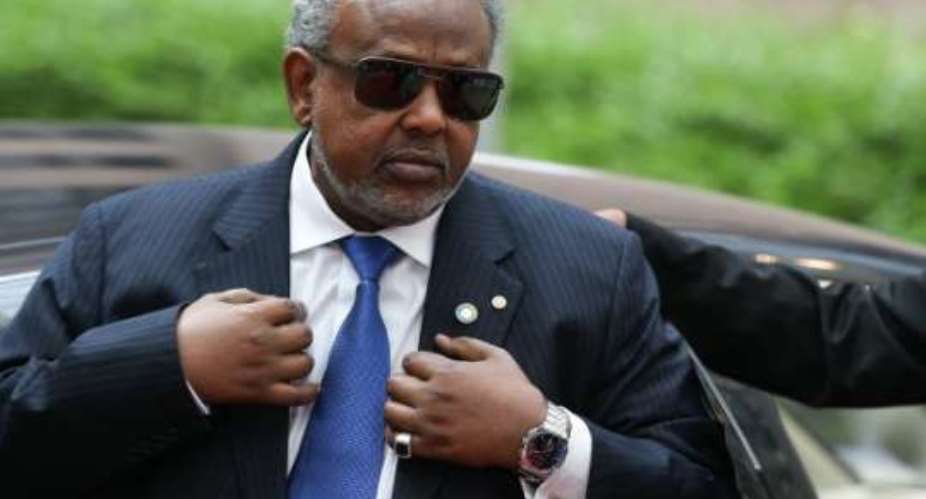By Desmond Davies, London Bureau Chief
London, May 31, GNA - Having secured a controversial fourth term in April, President Ismail Omar Guelleh of Djibouti now has to face the reality of his country's mounting external debt, a failing economy and worst drought in 50 years.
Despite the economic pressure and criticism from allies such as the US, President Guelleh is focussing on consolidating his power by continuing to crack down on political opponents.
His government has spent close to $90 million over four years in pursuit of his main opponent, Abdourahman Boreh, through failed litigation in the UK courts.
Now the government has decided to take on Facebook by bringing legal proceedings against the company over claims that offensive posts have been made against President Guelleh on the social media website.
He wants Facebook to provide details of the account, remove the offensive posts and prevent similar material being published in the future.
President Guelleh's opponents, though, are planning to launch a television channel in London by the end of this year.
In the meantime, the UN has estimated that some 20 million people in the Horn of Africa are facing 'critical and emergency food security'.
Djibouti, according to the UNHCR, has limited resources and the drought problem has been exacerbated by the country's debt to China, which provided loans for the government to undertake major infrastructure projects to appease the electorate.
Exim Bank of China (EBC) provided the bulk of the hundreds of millions of dollars of finance for the projects that were mainly undertaken by China Civil Engineering Construction Corporation (CCECC).
The result is that Djibouti's debt is expected to peak at 81 per cent of gross domestic product (GDP) by 2018, according to figures from the International Monetary Fund (IMF),
'High debt-financed public investment spending is exerting considerable fiscal and external debt pressures,' notes the IMF, which added: '…the current fiscal stance appears unsustainable.'
The African Development Bank (AfDB), in its assessment of the country's economy, said: 'Djibouti's external position remains fragile because of deficits in its trade balance and current accounts.
'The level of debt remains critical and puts Djibouti at high risk of over-indebtedness.'
The AfDB added: '…the economy of Djibouti lacks diversification [and] it has not made possible a significant reduction in poverty.
'The economy is mainly concentrated on transport activities and connected services that are served by the country's geostrategic position on the Gulf of Aden, at the intersection of strategic maritime trade corridors for the transport of goods and oil.
'The concentration of economic activities and jobs in the city of Djibouti, notably around the port and foreign military bases, has encouraged a considerable flow of inhabitants to the capital, accelerated by unemployment and drought.
'Today, nearly 80 per cent of the population is concentrated in the country's towns, with more than 60 per cent in the city of Djibouti, the capital,' the assessment added.
The unemployment rate is a high 60 per cent.
The Chinese debt, with a rate of over five per dent, is to be paid over 10 years and without a grace period, but there are some worries in Beijing about Djibouti's ability to service the debt.
Djibouti is among many African countries that believe that Chinese investment and influence on the continent would bring development.
Many greeted the arrival of the Chinese as big economic players in the region, which began in the mid-1990s, with great enthusiasm - especially the leaders of states whose economies depend heavily on minerals.
China's share of the global consumption of refined metals rose from five per cent in the early 1990s to 45 per cent in 2010; its oil consumption increased fivefold during the same period. In 2002, Chinese trade with Africa was worth $13 billion; a mere decade later, that figure had soared to $180 billion, three times the value of US trade with the continent.
The hope was that with China directly competing with Africa's economic partners in the West, African countries would win better terms for themselves.
But what has happened is that Chinese firms have focused their attention on African countries that face sharp credit restrictions or economic boycotts from the West, owing to coups or human rights abuses.
In the case of Djibouti, apart from infrastructure development, the Chinese now have a military base in the country, alongside the US and France.
American politicians have been critical of the Chinese presence in Djibouti, with two Republican Senators writing to the Secretary of State and Defence Secretary about this.
There are currently 4,000 US troops stationed in Djibouti while the Chinese expect to have 20,000 personnel.
GNA





 We’ll protect state wealth from opaque deals – Prof Jane Naana
We’ll protect state wealth from opaque deals – Prof Jane Naana
 Mauritania president says running for second term in June polls
Mauritania president says running for second term in June polls
 I won't ever say I was a mere driver’s mate' — Prof. Opoku-Agyemang
I won't ever say I was a mere driver’s mate' — Prof. Opoku-Agyemang
 2024 polls: 'EC struggling to defend credibility'— Prof. Opoku-Agyemang
2024 polls: 'EC struggling to defend credibility'— Prof. Opoku-Agyemang
 Akufo-Addo gov't's 'greed, unbridled arrogance, unrestrained impunity, sheer dis...
Akufo-Addo gov't's 'greed, unbridled arrogance, unrestrained impunity, sheer dis...
 Election 2024: Ghana needs an urgent reset, a leadership that is inspiring – Ma...
Election 2024: Ghana needs an urgent reset, a leadership that is inspiring – Ma...
 Partner NDC to rollout a future of limitless prospects – Prof Jane Naana Opoku-A...
Partner NDC to rollout a future of limitless prospects – Prof Jane Naana Opoku-A...
 NPP will remain in gov’t till Jesus comes — Diana Asamoah
NPP will remain in gov’t till Jesus comes — Diana Asamoah
 Sunyani Technical University demands apology from former SRC president over sex-...
Sunyani Technical University demands apology from former SRC president over sex-...
 'Dumsor' was resolved by Mahama but ‘incompetent' Akufo-Addo has destroyed the g...
'Dumsor' was resolved by Mahama but ‘incompetent' Akufo-Addo has destroyed the g...
